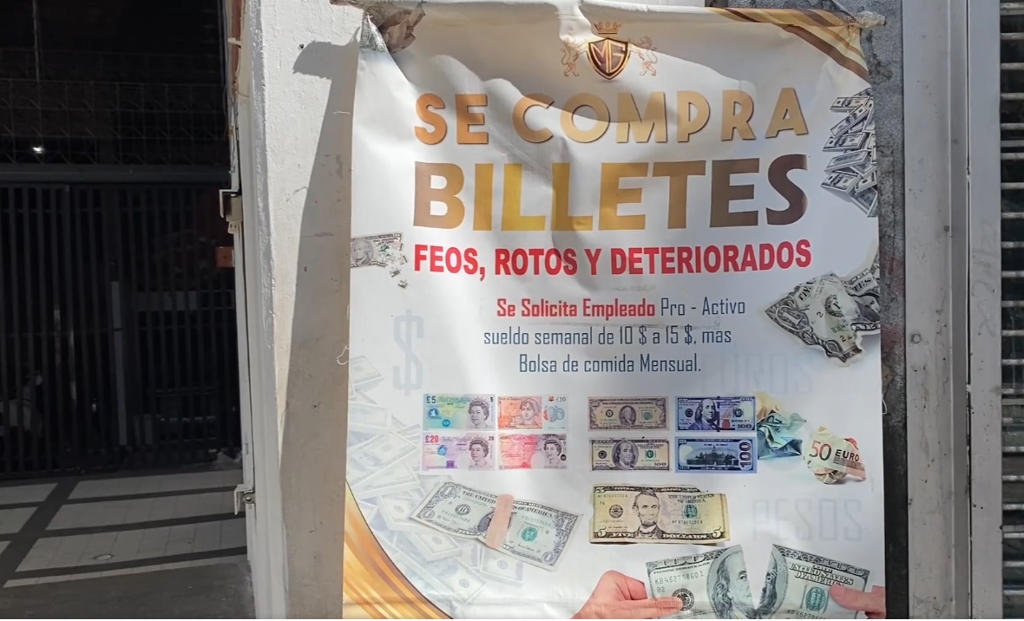TODAY VENEZUELA – On the streets of Venezuela, dollar bills that have been punctured, erased, stained, scratched, discolored, or burned are bought for half their value. This is the new business emerging in the country due to the impossibility of exchanging foreign currency in banking institutions.

The unusual commercial practice appears in the view of the refusal of businesses to receive deteriorated American bills. This was revealed by the Voice of America in a video showing the informal exchange.
According to El Estímulo, “with the rise of the dollar as a common currency, precautions regarding bills in circulation were also increased.” In Caracas, inns and businesses impose restrictions to receive the green currency in cash by requiring their clients to present bills that show no signs of deterioration.
The same is the scenario in Lechería, Valencia, Maracaibo, and Puerto Ordaz, where an “eye inspection” is decisive.
Being careful not to lose money
Others claim that when depositing them in a bank abroad, they face obstacles when delivering them, and for others, they only say it is a matter of aesthetics. However, the US Federal Reserve lists a bill as “unfit” only if it has a hole of more than 19 square millimeters (about the size of an aspirin) and if the five, ten, and twenty-dollar bills date back to 1996 because of their age.
Watch the video: Compra de dólares deteriorados: un negocio en auge en Venezuela
A booming business
In Venezuela, the need to undertake this is mixed with creativity and Creole liveliness in a business that reveals that “there is always someone who won’t let a crisis go to waste,” states El Estímulo.
Already on social media, there are “companies” with paid advertising on Instagram, promoting their service that is oriented to “hunting ugly bills” for a lesser value.
“Just as people are looking to buy dollars to send to their accounts abroad, others buy cash to do their business,” the media reports.
In this exchange, large-denomination bills are bought for a value closer to that published by the indicators on social networks, but in the case of low-denomination bills, more is lost in the exchange because they have “the highest turnover in the country and are the most difficult to get rid of.”
What happens to the bad bills purchased is not clear, says El Estímulo, but they should go to the US Bureau of Engraving and Printing to be replaced.
Maduro’s enthusiasm
Irrespective of the situation, Nicolás Maduro’s goal this year is “a new economy, a different and dynamic economy.” To say this, he raised his voice and adjusted his glasses in the National Assembly. It is decided. From now on, he wants dollars circulating everywhere, in the popular markets and shopping centers, in the banks, and the digital space but “legally.”
In three hours of memory and account of his annual management, he announced that the Venezuelan banking would offer accounts in dollars that will be affiliated to a “digital economy card” to buy and sell in Bolivars, reported El Nacional.
It will be “a conversion for a sustained recovery process of the national currency.” He also admitted the use of transactions in dollars to buy from real estate to a coffee shop.
An open road
With this announcement, El Impulso maintains that the dollarization that Venezuela has been experiencing for some years now will continue to pave the way in 2021 with the partial approval of the regime.
The publication quoted Luis Arturo Bárcenas, senior economist of Ecoanalítica, saying that although what Maduro said does not imply anything new, it does point towards a “change of position.”
He also believes that dollarization will lead to greater inequality, analyzing that although it represents an escape valve, the currency will not be available to everyone.
However, Zelle is the money transfer service used by Venezuelans, owned by a group of seven US banks that so far leads transactions in the country.
This service works for purchases in dollars, and with it, you can acquire anything from chocolate, a new pair of sneakers, and medicines, following the controls imposed by the regime that triggered a black market.
Panampost.com













